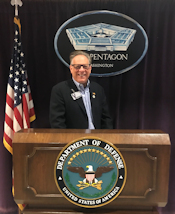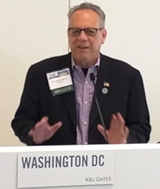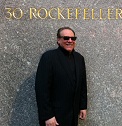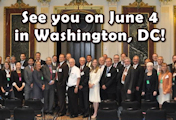
Today we are proud to announce our inaugural COFES Institute newsletter. We will be interviewing visionaries and thought leaders from our community. Our first interview is with Brad Holtz, co-founder of COFES.
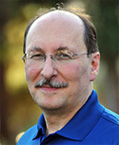 Brad Holtz
Brad Holtz
Since 1999, as co-founder and CEO of Cyon Research Corp., Brad built and led a team of industry analysts focused on the field of software for design and engineering. In that role, he also led the creation of COFES: Congress on the Future of Engineering Software.
—————————————————
COFES Institute Interview with Brad Holtz
September 2017
SW: Hello Brad! We are delighted you could spend some time with us today. There’s quite a bit to discuss so let’s jump right into it. First off, I wanted to get your thoughts on the transition to human-assisted design, which is the theme of COFES 2018. Can you give us a little context of how we got to where we today?
BH: Sure. We have seen an evolution in CAD that has progressed from mainframes in the 1960’s, to mini computers in the ‘70s, to workstations in the ‘80s, and on to microcomputers/PCs from the 90’s on. Our CAD software tools have evolved along with the hardware, eventually leading us to generative design tools and the advent of Human-Aided Design, which is what we are on the verge of today. With Generative design, an architect or engineer can quickly evaluate hundreds of automatically generated design alternatives. These alternatives can be tested and tweaked to kick off a next round of iterations. Designers learn from each iteration what works and what does not. The generative design process also enables designers to create options that would not have been otherwise possible, coming much closer to an optimal design. Generative design is one of the first steps of human-aided design. In the big picture, human-aided design is changing the relationship between who is doing the creation, where the creation is happening, and where the judgment is happening.
SW: Interesting. What is the next part of the evolution in generative design?
BH: The next part is when we start adding cognitive analysis and related tools to our CAD systems. This part involves engineers talking with and interacting with their computers to achieve a desired design. The computer is doing the designing, led through human interaction, as opposed to the other way around. It is a 180-degree shift.
SW: They did this kind of design engineering on an episode of “Star Trek: The Next Generation.”
BH: Yes, this type of engineering was the domain of science fiction, but no longer. We are now at the stage where we can actually do it. We’ve seen huge leaps in processing and storage technology over the past couple of decades.
SW: Yes, we certainly have! So we are in an age of generative design and making a transition to human-aided design that once was the domain of science fiction.
BH: That’s right. We have most of the tools today necessary to accomplish what I’m talking about. But they’re not coordinated or all in the same place yet. Software developers need to understand what it is they should deliver and how they want to deliver it, and then take these technologies and then figure out where they want to apply them. For example, where do we want to apply machine learning? That’s really the key. We have all the tools in the toolbox we need. That, of course, doesn’t mean that we can do it yet. We have to go out and start down the road of not so much automating, but adding cognitive technologies and intuition and interpretation into our systems. The vendors in this industry have the ability to do this now. The software exists to do it.
SW: I see. What role do you envision COFES playing in this evolution toward human-aided design?
BH: When my colleagues and I founded COFES in fall of 1999 we first did a formal summit at the Palmer House in Chicago with sixty-four people. It was very well received. That gave us basically the green light to go ahead with COFES, which is the Congress on the Future of Engineering Software. When we did the summit, the purpose of the summit was to follow the ideas from the great summits in chemistry and physics at the turn of the previous century because we were at the turn of this century. We said, “Ok, let’s get the leaders of this industry together and talk about what are the big issues of the day.” And that’s what we did. And that evolved into a congress discussion talking about these big issues. The guiding principals of COFES from my standpoint have always been to foster collaboration and communication with the intent of pushing the industry as a whole to serve its customers better, faster.
SW: A very commendable endeavor, indeed. Bravo!
BH: Thanks. When we launched COFES we wanted to make an impact. It was never about the money. Look at the things that came out of COFES. There’s the 3D PDF Consortium. Magic Leap was conceived at COFES. Intel’s Larabee architecture, came from chat between Jon Peddie and Omid Moghadam at COFES back in 2003. And there have been a large number of acquisitions that have taken place because of introductions that have happened at COFES. There have been a lot of long-term relationships formed at COFES. There have been companies that have been funded as a result of being at COFES. COFES has been fostering a long look at the future. COFES is that time in the calendar when you can pick your head up out of your day-to-day rut and take a longer term view. That’s what COFES has been about.
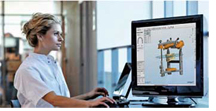 SW: That’s wonderful, Brad. How do you see COFES evolving going forward?
SW: That’s wonderful, Brad. How do you see COFES evolving going forward?
BH: Cyon Research donated COFES to the newly formed non-profit, COFES Institute this year, with the goal to take COFES to the next level. I’ve taken COFES about as far as I can take it, personally. I felt it was time to move it forward for the next generation, with new ideas and new blood, putting COFES on a firm foundation where it can grow for the long term. And I’m not walking away from COFES. I’ll still be there, still supporting it behind the scenes and still guiding it. But I won’t be driving it. With the COFES Institute taking control of the event, I’ve offloaded most the enormous amount of time I’ve been required to commit to the event. I will still be at COFES as moderator. I will still be engaged in providing advice behind-the-scenes and coaching the new team as they move forward. But, I’m not the one who will be driving it. I will be very engaged, but it will be other people pushing it forward and a next generation driving the vision for future generations. That’s really what the event needs to go on for the next eighteen years.
SW: Well it is terrific to know that you will be involved in COFES going forward. We spoke at the end of last year about your vision of COFES going forward. You wanted to build out the community through a membership organization.
BH: Yes. Community building is important to how I see COFES evolving in the future. We’ve invested six-figures in producing video and audio from COFES to make available to the general public. There are literally hundreds of hours of video and audio that are up on the website. Cyon Research hasn’t had the focus or resources to publicize that. It’s been free for everybody for a long time. One of the things the COFES Institute will be able to do is push these assets to the broader community –to let people know that the content is out there. They can also spend the time to index it so that it can achieve greater reach and they can work with the COFES community to add richness and provide ongoing value through evolving into a membership organization that continue with the goals of COFES.
It seems to me that a membership organization is the right direction to go in. It doesn’t need to be painful to be a member in terms of costs, but there should be some significant value to being part of this community. We also want to bring other voices in here, particularly voices of future superstars from the next generations. The COFES Institute will continue our efforts of proactively identifying who are the likely leaders of the next generation – trying to spotlight them, bring them to the event, and have their voices heard earlier, and also to get them connected with people who can accelerate their career.
SW: Very good, Brad. Let’s talk about the next generation. What are some of the things they are doing that get you excited?
BH: You’d be hard pressed to find anyone under 50 who started in the era of drafting boards. When I started college, we still used slide rules – calculators didn’t come until later. The generation after me had calculators. The generation after that had computers. And the generation after that had iPhones. The current generation has more computational power in their pocket than the most powerful computers in the world from the time I was in school.
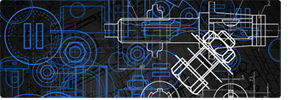 SW: When I think about the next generation, I think of VR, AR, AI, Machine Learning, Additive Manufacturing and 3D Printing. How do you see these fitting in with COFES going forward?
SW: When I think about the next generation, I think of VR, AR, AI, Machine Learning, Additive Manufacturing and 3D Printing. How do you see these fitting in with COFES going forward?
BH: Well, all of these technologies have been part of the conversations at COFES for a very long time. They haven’t been center stage at COFES, but they are evolving from the sidelines toward the center stage. In 2002, we had Eric Drexler talking about nanotechnology. In 2004 we had John Koza talking about genetic programming. Six years ago we had a talk about storing data reliably for eons, encoding the data in gut bacteria DNA. The whole idea here is not to get people to change, but to get the industry’s leaders -the people who create the tools for the people who create the world – to start thinking about these things years in advance. What we are trying do to is to influence the context of the conversation.
SW: That’s refreshing to hear. Let’s wrap this interview up by returning to theme of COFES 2018 and the transition from human-centric to human-assisted design. What role do you see the emerging technologies associated with the current generation playing?
BH: The transition underway is from humans doing everything and being helped by a computer, to human-assisted, where the computer is our right hand, so to speak, and can do things and generate ideas for us where we are making decisions based on information that is presented to us based on queries.
SW: That’s a huge leap. Please continue.
BH: Yes. It is a major leap, and we are just at the very beginning of what will be a very long path. And so what we are trying to do now is to have this conversation up front about where we want to go so that the people who are helping us get to where we want to go can start thinking about it in ways that are constructive. We are in that exploration stage.
Now, any time we go through these major transitions there is huge difference between what is possible, what is practical, and what is pervasive. We are dangling with what is possible at COFES. Some people at the leading edge are using portions of this in a way that is practical; particularly if we are talking about specific, isolated things like external facades on a building or the structure for a chair or a crash structure, if you will. In the beginning we were using computer-aided drafting to do building perimeters and cores. This took a dozen or two years before it was pervasive. Think about it as a generation.
With respect to the major trends, there is VR and AR; there is Machine Learning and New Manufacturing, which includes Additive and Multi-mode manufacturing. Multi-mode is additive and subtractive together. VR is allowing us to explore a concept in the computer separated from the real world. Augmented reality, or what some people refer to as mixed reality, is an overlay of information on top of the real world. Those are two very different things. I think of VR is going to make a change in the way we think about things. AR is going to change the way we do things and interact with them. Machine learning and cognitive systems are tools that replace our cognitive load and allow us to focus on other things and enable us to do things that would not have been possible before. New Manufacturing allows us to create things that could not have been done before; it allows us to create things where they could not have been created before. It allows us to change the iterative loop between how things are created and when and where they are created and allows us to directly go from the computer to a physical object that I can hold in my hand, as opposed to VR which allows me to create a physical object I can see and with haptics I think I can touch.
SW: Good stuff, Brad! We’re looking forward to discussing these things further at COFES 2018. For our last interview question, what are the two or three most important things you have learned or experienced since you have been part of the COFES community?
BH: (long pause…) There are so many ideas that we have brought to COFES. One of the most important things I’ve learned is the value of communicating with your competitors, or put another way, the value of a beer with a competitor at the pool. There aren’t many places where you can go and sit around the pool with a beer with the people you are competing against in the marketplace the rest of the year. At COFES there is the ability to talk about things that are so far in the future that they aren’t in the competitive landscape. They can make a difference for everyone. The other thing is the value of identifying the areas that are not competitive advantage. That’s one of the things we’ve done and focused on at COFES. That is, how do we get the community to do things as a community when there is no competitive advantage and a significant cost for each of the members of the community to do it on their own? We know that companies within industries are all about getting a competitive advantage and building customer relationships, but not everything is competitive advantage. Some things just need to exist. The 3D PDF Consortium is one of those ideas that came as a result of this.
Let me just add this: I’d like anyone reading this to pay attention to and be on the lookout for the people who are going to be making a name for themselves – our future superstars. Tell us about them. Let work together on getting them to COFES and let’s get their careers accelerated. I’ll be working behind the scenes with the COFES Institute to help recruit the next generation of leaders in our industry.
SW: Cheers to that, Brad! We thank you for your time today. It has been a pleasure, as always, speaking with you. We look forward to seeing you at COFES 2018.
BH: You are welcome. I’m looking forward to the event.
 Steve Waite is a member of the COFES Institute Advisory Board. He is the author of several books, including Quantum Investing and Venture Investing in Science.
Steve Waite is a member of the COFES Institute Advisory Board. He is the author of several books, including Quantum Investing and Venture Investing in Science.
—————————————————
I hope you enjoyed our first newsletter. I would like to thank Brad and Steve for their participation in the interview.



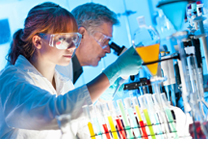 What: The Technology Development Pathways workshop will showcase NNI success stories where nanotechnology has had commercial impact. Keynote presentations will highlight the pathways companies have taken to get from research to commercialization. Afternoon panel discussions will focus on specific steps of the development pathway, such as scale up and quality control/measurement systems. Conversations at the workshop will enable companies to share best practices for overcoming technical challenges during the commercialization of nanotechnologies. This event will support the goals of the
What: The Technology Development Pathways workshop will showcase NNI success stories where nanotechnology has had commercial impact. Keynote presentations will highlight the pathways companies have taken to get from research to commercialization. Afternoon panel discussions will focus on specific steps of the development pathway, such as scale up and quality control/measurement systems. Conversations at the workshop will enable companies to share best practices for overcoming technical challenges during the commercialization of nanotechnologies. This event will support the goals of the 
 Brad Holtz
Brad Holtz SW: That’s wonderful, Brad. How do you see COFES evolving going forward?
SW: That’s wonderful, Brad. How do you see COFES evolving going forward? SW: When I think about the next generation, I think of VR, AR, AI, Machine Learning, Additive Manufacturing and 3D Printing. How do you see these fitting in with COFES going forward?
SW: When I think about the next generation, I think of VR, AR, AI, Machine Learning, Additive Manufacturing and 3D Printing. How do you see these fitting in with COFES going forward? Steve Waite is a member of the COFES Institute Advisory Board. He is the author of several books, including Quantum Investing and Venture Investing in Science.
Steve Waite is a member of the COFES Institute Advisory Board. He is the author of several books, including Quantum Investing and Venture Investing in Science.